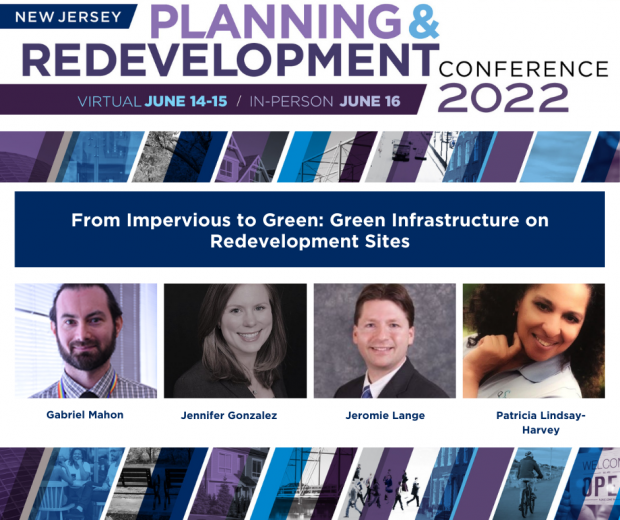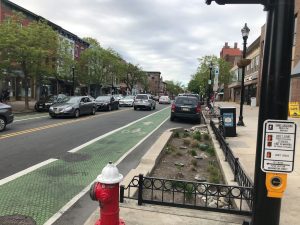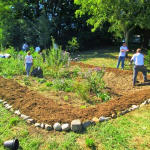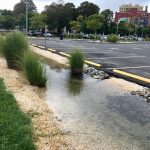New Jersey Future Blog
Reducing Rain’s Repercussions: Exploring the Potential for Green Infrastructure on Redevelopment Sites
July 8th, 2022 by Andrew Tabas
 “The benefits of green infrastructure are boundless,” says Jennifer Gonzalez, Director of Environmental Services and Chief Sustainability Officer in Hoboken. Green infrastructure (practices like rain gardens, green roofs, and rain barrels that capture stormwater) can brighten towns through more beautiful streetscapes, reduced flooding, improved health of both people and ecosystems, and increased pollinator habitat. During the “From Impervious to Green: Green Infrastructure on Redevelopment Sites” session at the 2022 NJ Planning and Redevelopment Conference, three stormwater experts joined Jennfer for an exploration of strategies to increase green infrastructure implementation across New Jersey.
“The benefits of green infrastructure are boundless,” says Jennifer Gonzalez, Director of Environmental Services and Chief Sustainability Officer in Hoboken. Green infrastructure (practices like rain gardens, green roofs, and rain barrels that capture stormwater) can brighten towns through more beautiful streetscapes, reduced flooding, improved health of both people and ecosystems, and increased pollinator habitat. During the “From Impervious to Green: Green Infrastructure on Redevelopment Sites” session at the 2022 NJ Planning and Redevelopment Conference, three stormwater experts joined Jennfer for an exploration of strategies to increase green infrastructure implementation across New Jersey.

In Hoboken, street trees, rain gardens, and bike lanes make streets more welcoming to all road users while managing stormwater. Photo credit: Andrew Tabas
It is an exciting time for green infrastructure advocates in New Jersey because the New Jersey Department of Environmental Protection (NJDEP) is working on two key regulations. First, NJDEP is in the process of updating the Stormwater Management Rules. As Gabriel Mahon, bureau chief of the Bureau of New Jersey Pollutant Discharge Elimination System (NJPDES) Stormwater Permitting and Water Quality Management in the NJDEP, explained, the current rules require the use of green infrastructure on new “major development” projects. Towns implement the rules through their Stormwater Control Ordinances. Municipalities should stay tuned for the New Jersey Protect Against Climate Threats (NJ PACT) regulations, which may update green infrastructure requirements.
Second, as Mahon explained, NJDEP is also updating the Municipal Separate Storm Sewer System (MS4) Permit. The MS4 Permit determines the way in which towns convey rain from streets and buildings to nearby rivers. Municipalities should prepare for the release of the final draft 2023 MS4 Permit. The preliminary draft permit explored the new idea of requiring municipalities to develop Watershed Improvement Plans, which would be a tool for each town to determine the best way to improve its own water quality.
Patricia Lindsay-Harvey, Willingboro Municipal Utility Authority and Willingboro Green Team Chair, and Jeromie Lange, Director of Development, Active Acquisitions LLC, showed that environment advocates and real estate developers can find common ground on green infrastructure policy. “Not only is green infrastructure necessary, but it’s beautiful; it has a great impact on mental health,” emphasized Lindsay-Harvey. Lange also emphasized his desire to see more green infrastructure implementation in order to “mimic the natural hydrology.” From the developers’ perspective, consistency and a “common sense” application of regulations are critical.
On redevelopment sites, there are many “opportunities for innovation” according to Lange. Mahon of the NJDEP explained that redevelopment projects can count as “major development” under the current Stormwater Management Rules, and that the requirements for these sites depend on the project size and whether there is a net increase in impervious surface. Implementing green infrastructure on redevelopment sites is essential to improving water quality across the state in the long term. In Hoboken, Director of Environmental Services Gonzalez added, the Citywas able to complete a redevelopment project at 7th St. and Jackson St. that managed stormwater above- and below-ground, while providing new community spaces.
All four speakers agreed that it will be essential to manage the stormwater generated by the state’s roads and bridges through the implementation of Complete and Green Streets. This is important because streets contribute to NJ’s overall impervious surface (see below). The New Jersey Department of Transportation (NJDOT) should step up its development of Complete and Green Streets on state-owned roads and should steer funding toward local projects that incorporate green infrastructure, sidewalks, wheelchair accessibility features, and bike lanes.

Roads, bridges, and roofs are all examples of impervious surfaces. This map shows the distribution of impervious surfaces in New Jersey. The dark red areas have more impervious surfaces than the lighter areas. Photo credit: New Jersey Water Risk and Equity Map; data from the Multi Resolution Land Characteristics Consortium.
Stormwater utilities (a dedicated funding mechanism for stormwater management in which users are charged a fee based on impervious cover) are one potential tool to incentivize the use of green infrastructure including, as several panelists highlighted, on state-owned streets. The four panelists agreed that effective and well-managed stormwater utilities are essential to promoting green infrastructure across New Jersey.
There are many ways for residents to get involved in the journey of mainstreaming green infrastructure across New Jersey. These include joining the local green team, building a rain garden, motivating students to build green infrastructure at their school, commenting on site plans to support developers who use green infrastructure, and becoming a Green Infrastructure Champion. As Jennifer Gonzalez of Hoboken said, “we are all in this together,” so start your green infrastructure journey today!
Related Posts
Tags: complete and green streets, green infrastructure, mainstreaming green infrastructure, Stormwater, stormwater management
















